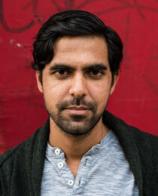Karan Mahajan
Biography
Karan Mahajan
Karan Mahajan is the author of THE ASSOCIATION OF SMALL BOMBS, which was a finalist for the National Book Award, won the New York Public Library Young Lions Fiction Award, and was named one of the Ten Best Books of the Year by The New York Times Book Review. His debut novel, FAMILY PLANNING, was a finalist for the Dylan Thomas Prize. He has been selected as one of Granta’s Best Young American Novelists, and his writing has appeared in The New Yorker, The New York Times, Vanity Fair, The New York Review of Books and other venues. He is an associate professor of Literary Arts at Brown University.
Karan Mahajan
- Website: https://www.karan-mahajan.com
- X: https://x.com/kmahaj





